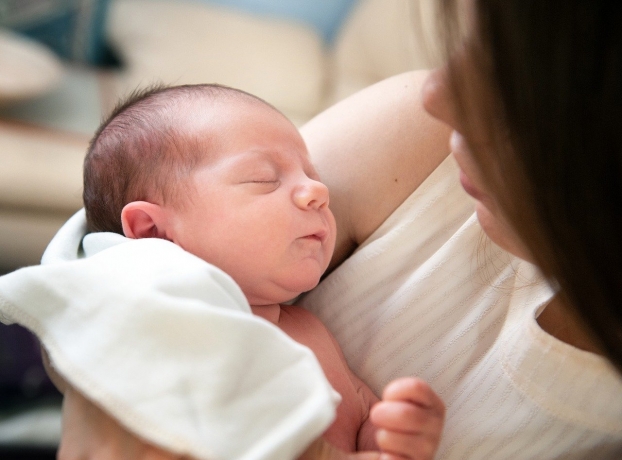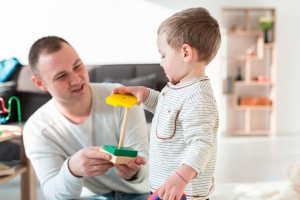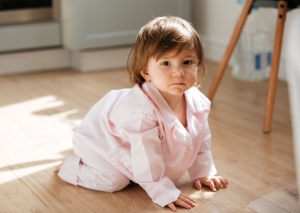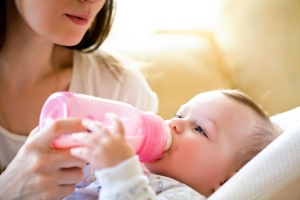A baby sleep is as soft as angels' sleep and is highly important for the baby's brain development, especially during the first months of his life. So it is important to know what to do and what not to do in everything related to their sleep.
1. Baby sleep; Newborn's sleep
Newborn’s baby sleep is a succession of short periods of sleep in cycles of 2 to 4 hours.
The cause: his need to eat.
The newborn sleeps between fifteen to twenty hours a day.
Two stages of baby sleep:
- Calm sleep
- Agitated sleep.
Calm sleep (deep sleep later):
- It occupies about 40% of sleep time.
- It participates in the growth and development of the newborn.
Agitated sleep (paradoxical sleep later):
- It occupies more than 50% of sleep time
- It participates in the maturation of the brain.
2. Baby sleep patterns by age
A newborn baby sleeps as needed, rarely during the hours that are convenient for its parents. At birth, he makes no difference between day and night. Indeed, his body clock, which regulates the periods of wakefulness and sleep, is not yet adjusted.
The newborn baby usually sleeps in periods of 2 to 4 hours, but rather about 2 hours if breastfed. Some infants wake up mainly to drink, while others spend more time awake from birth. It depends on their temperament.
You don't have to wake a healthy baby to feed it. However, if your baby has any health problems or special medical condition, follow your healthcare professional's recommendations.
2.1 Baby sleep; between 0 and 3 months old?
Typically, a newborn baby sleeps about 14 to 18 hours a day. From the age of 1 to 3 months, they sleep about 14 to 17 hours a day and can stay awake for 2 or 3 hours at a time. At this age, his waking period is usually longer at the end of the day, between 5 p.m. and 10 p.m.
2.2 Baby sleep; babies from 4 to 12 months
At this age, babies sleep about 14 hours a day, but it can be normal to sleep more or less. At 4 months, most babies need three naps a day - a nap in the morning, another in the afternoon, and one in the early evening.
Between the ages of 6 and 12 months, your baby will likely go from 3 naps per day to 2 longer naps in the morning and afternoon. Every baby's needs are different. Some nap for only 20 minutes, while others sleep 3 or more hours.
Healthy sleep habits for your baby
- When possible, maintain a regular schedule for naps and bedtime.
- It is important to maintain a stable routine. Many parents like to use the same 3 things: give him a lukewarm water bath, read him a book, and put him in bed.
- Avoid putting your baby to bed with his bottle. This habit promotes tooth decay.
- Around 6 months of age, if your baby wakes up at night and cries, go see him to make sure everything is okay, that he's not too cold or too hot, but don't take him out. Comfort him by stroking his forehead or talking softly to show him you're there. This will help him learn to console himself, which is important for him to learn to go back to sleep on his own.
2.3 Baby sleep; toddlers from 1 to 2 years old
Most toddlers sleep 11 to 2 hours in 24 hours.
Healthy sleep habits for your little one
- It is still essential to maintain a sleep schedule that your child recognizes. Habits established before the age of one are even more important to your little one.
- Avoid naps too late during the day, as they can interfere with sleep at night.
- Help your child calm down about half an hour before bedtime by telling him stories and directing him to calm activities.
- Be gentle but firm when your child protests.
- Keep the bedroom quiet, comfortable, and suitable for sleep, for example, by using dim lighting.
- A calming music can be comforting.
- Transitional objects (such as a blanket or a stuffed animal) often become important at this age.
Related: Simplifying Life with the Baby Led Weaning Method; Guide and Recipes
3. Baby sleep; the importance of sleep and naps
- Sleep is necessary for the physical and psychological health of your infant.
- It allows your infant to retain the learning he is doing.
- The growth hormone released during sleep allows him to grow.
4. Baby sleep; the environment for good sleep
To promote good sleep, the environment is important. Here are the elements to consider:
- The bedroom should be a quiet place away from the noise.
- The ideal temperature is around 18-20 ° C.
- The humidity level must be less than 50%.
- The Canadian Pediatric Society recommends that your infant sleep in your room for the first 6 months of life.
- The bedroom and the bed must be associated with sleep.
-The baby bed must meet safety standards.
- For his safety, your infant should sleep in a crib, not in your bed, to prevent Sudden Infant Death Syndrome or accidental death while sleeping.
- Your infant should be comfortable and feel secure in the bedroom.
- The mattress should be firm.
- There should not be a heavy blanket, pillow, or object in the bed that could interfere with his breathing or injure him.
- You can dress your infant in a sleepwear and swaddle him with a light blanket. Make sure he doesn't have too much hot. The body needs to lower its temperature to sleep.
- Lay your infant on his back. However, as soon as he turns alone, it is no longer necessary to put him on his back. He can choose his position.
- At home, your infant should ideally sleep in the same bed during naps and at night.
- Allow your infant to live in an environment free from smoke for his health and to prevent sudden infant death syndrome.
5. Baby sleep; what are the baby's sleep problems?
There are different types of insomnia and sleep-onset disorders:
Very early insomnia:
Awakenings are very frequent during the first weeks of life. These very early insomnias are characterized by:
- Great boisterous insomnia: the child cries and cries.
- Insomnia with intense motor activities often of the "self-aggressive" type. The baby swings, rub certain parts of the body, scratches, bumps, screams ...
- Great silent insomnia: the baby's eyes are wide open most of the day and night.
6. Baby sleep; what if my child regularly has difficulty falling asleep?
Some children have difficulty falling asleep alone and may stay awake for long periods of time. This can be due to spending too long in front of a screen before bed or by the caffeine in soft drinks and energy drinks.
If your child uses screens for long periods, try to limit screen time or exclude it from their routine.
Do not give your child to eat or drink products that contain caffeine.
Encourage relaxing activities before bed, such as reading, listening to quiet music, or having a calm conversation with your child about their day while you are lying in bed with them.
If these things aren't responsible for your child's sleep problems, talk to your doctor about other ways to help them fall asleep on their own.
- Baby’s food recipes from 6 to 12 months
- Baby fever, don’t panic and know how to deal with it
- Crying, Smiling, Eureuh, Babbling; how to decipher a baby’s language?
Originally published on Live Positively.






